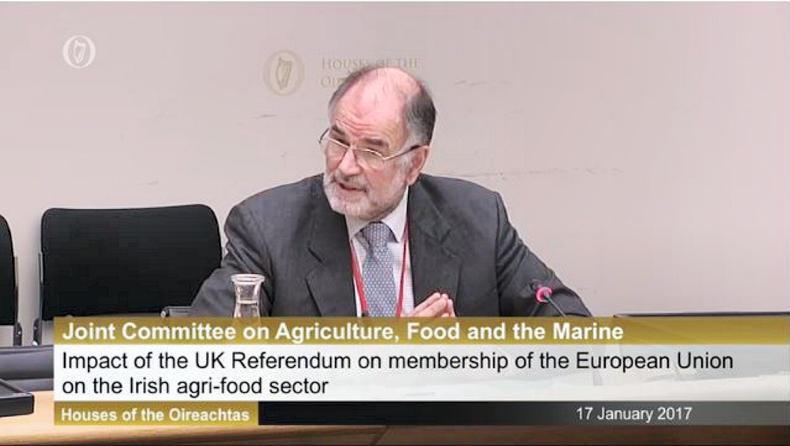Ireland needs to look into having larger farms in terms of area to make our produce more competitive, according to Professor Alan Matthews.
“To give another €200/cow subsidy is simply not the way forward,’ Matthews told the Joint Oireachtas Committee on Agriculture on Tuesday. “I think we need to go back and look at maybe having larger farms in terms of area. I don’t see us getting a market price of €4.75/kg in the future, not with Brexit or markets.”
He suggested that, instead, there is scope for use of market-based instruments such as risk-sharing contracts.
“The Commission has been promoting the use of an income stabilisation tool although, in my view, most farmers will continue to prefer to self-insure, relying on savings and borrowing and mechanisms such as tax averaging to ride out periods of market instability.”
Direct payments are neither sustainable or designed to address challenges faced on farms, according to Matthews.
“For farmers, they increase competition for land, push up land rents and prices, slow down structural change, make entry for young farmers more difficult and put downward pressure on product prices.”
As an alternative to direct payments Matthews suggests the following:
Payments should be targeted on specific objectives with a clear results orientation. Payments should be restructured within a one-pillar, programmed, multi-annual CAP. National co-financing should be required for all CAP expenditure. Decoupled direct payments should be gradually phased out over a pre-announced transition period. Savings should be redirected to more spending on improving competitiveness, climate action and environmental public goods, and possibly risk management. Payment entitlements should be replaced by a contractual framework between farmers and public authorities. Cross-compliance and the greening payment should be replaced with conditional greening whereby the receipt of public support would be conditional on enrolling in a basic (shallow) environmental scheme devised by the member state. Some proportion of EU budget resources should be allocated to member states based on performance as well as needs in order to provide incentives to achieve a higher level of EU value added. Read more
Listen: thinking outside the box on CAP
Ireland needs to look into having larger farms in terms of area to make our produce more competitive, according to Professor Alan Matthews.
“To give another €200/cow subsidy is simply not the way forward,’ Matthews told the Joint Oireachtas Committee on Agriculture on Tuesday. “I think we need to go back and look at maybe having larger farms in terms of area. I don’t see us getting a market price of €4.75/kg in the future, not with Brexit or markets.”
He suggested that, instead, there is scope for use of market-based instruments such as risk-sharing contracts.
“The Commission has been promoting the use of an income stabilisation tool although, in my view, most farmers will continue to prefer to self-insure, relying on savings and borrowing and mechanisms such as tax averaging to ride out periods of market instability.”
Direct payments are neither sustainable or designed to address challenges faced on farms, according to Matthews.
“For farmers, they increase competition for land, push up land rents and prices, slow down structural change, make entry for young farmers more difficult and put downward pressure on product prices.”
As an alternative to direct payments Matthews suggests the following:
Payments should be targeted on specific objectives with a clear results orientation. Payments should be restructured within a one-pillar, programmed, multi-annual CAP. National co-financing should be required for all CAP expenditure. Decoupled direct payments should be gradually phased out over a pre-announced transition period. Savings should be redirected to more spending on improving competitiveness, climate action and environmental public goods, and possibly risk management. Payment entitlements should be replaced by a contractual framework between farmers and public authorities. Cross-compliance and the greening payment should be replaced with conditional greening whereby the receipt of public support would be conditional on enrolling in a basic (shallow) environmental scheme devised by the member state. Some proportion of EU budget resources should be allocated to member states based on performance as well as needs in order to provide incentives to achieve a higher level of EU value added. Read more
Listen: thinking outside the box on CAP






 This is a subscriber-only article
This is a subscriber-only article










SHARING OPTIONS: